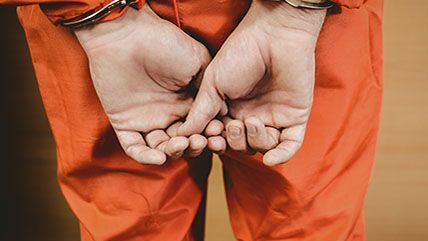The Disappearing Sixth Amendment
In many parts of the U.S., those who can't afford a lawyer must wait months to meet with public defenders.

You have the right to an attorney. If you cannot afford an attorney, one will be provided to you.
So goes the the Miranda rights spiel heard on 1,000 cop shows. But in many parts of the U.S., it's not quite true. Those who cannot afford a lawyer are left waiting for months to meet with public defenders already buried under other cases.
After Shondel Church was arrested for felony theft in 2016, the Missouri public defender service told him his case was winnable, but he would have to sit in jail six months before an attorney could prepare it. After waiting three months without a job and away from his family, Church took a plea deal. He's now the lead plaintiff in a federal class action lawsuit filed in March by the American Civil Liberties Union. The group is arguing that Missouri's woefully inadequate roster of public defenders violates poor residents' constitutional rights.
The Supreme Court ruled in the landmark 1963 case Gideon v. Wainwright that the Sixth Amendment guarantees a right to effective legal counsel. "Reason and reflection," the justices wrote, "require us to recognize that, in our adversary system of criminal justice, any person haled into court, who is too poor to hire a lawyer, cannot be assured a fair trial unless counsel is provided to him."
But states have undercut the Gideon guarantee by chronically underfunding public defender services. The 370 attorneys doing the work in Colorado have a load of more than 80,000 cases a year. A 2014 study by the American Bar Association (ABA) found that in 97 percent of cases, Missouri public defenders failed to meet the ABA's recommended minimum hours to effectively represent their clients.
And last year in Louisiana, where about 85 percent of criminal defendants qualify for a court-appointed attorney, 33 of the state's 42 public defender offices started turning away cases they said they no longer had the resources to handle. Their reasoning? What little legal assistance they could provide would be so ineffective as to violate defendants' constitutional rights anyway.
When public defender offices don't have time to investigate cases, file motions for discovery, or do any of the rudimentary legwork involved in preparing for trial, it leaves defendants at an enormous disadvantage. It's not a coincidence that Louisiana also has the highest incarceration level in the country and the second-highest wrongful conviction rate, according to the National Registry on Exonerations.
For the hundreds of thousands of poor defendants who churn through the criminal justice system every year, choosing between a plea deal or months in jail waiting on an attorney who will barely know the details of their case is a lose-lose proposition.
This article originally appeared in print under the headline "The Disappearing Sixth Amendment."


Show Comments (51)